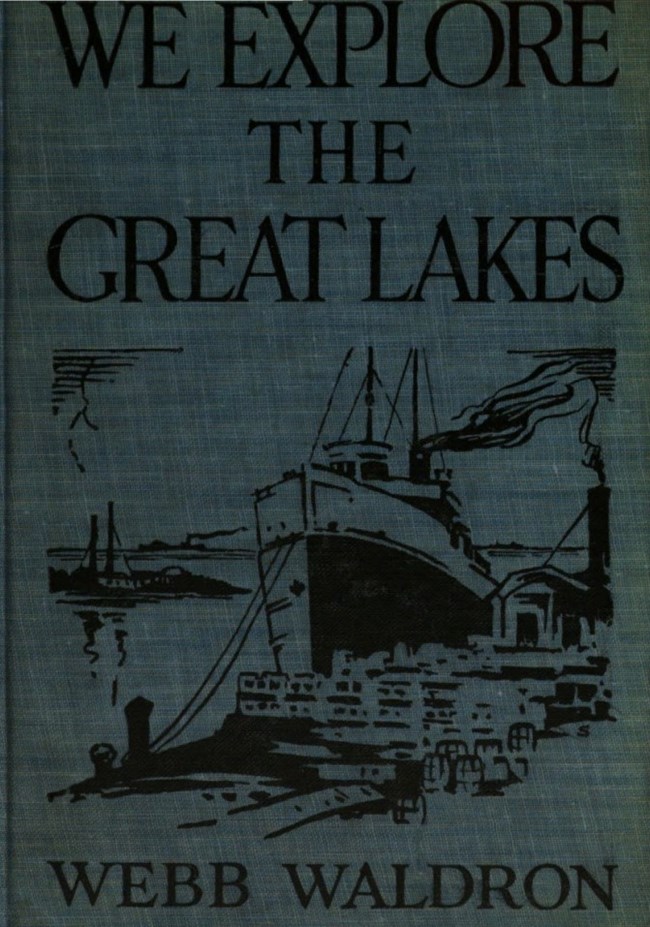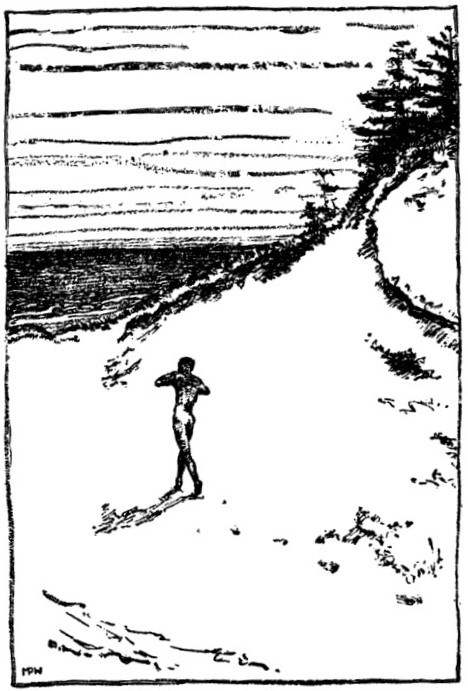Last updated: February 14, 2025
Article
The Dune-Faun

University of California
We Explore the Great Lakes
By Webb Waldron and Pictured by Marion Patton Waldron, 1923
In the summer of 1923, husband-wife duo Webb and Marion Waldron explored our nation's Middle West and inland seas. They wandered throughout the region and chronicled their adventures in their book, "We Explore the Great Lakes."
This excerpt tells of Mr. Waldron's time at the Indiana Dunes. He arrived by electric train to the Tremont Station, near today's Tremont Picnic Area. He then took a bus to Waverly Beach near today's Porter Beach. From there he walked up the beach to what is today's Indiana Dunes State Park.
Chapter XVII: THE DUNE-FAUN:
Flatness. Railroad tracks crisscrossing in every direction. Factories. Steel-mills. Ugly towns.
South Chicago, Hammond, East Chicago, Gary. . . . Somewhere I changed from the local train to an interurban car. The line, aiming toward Michigan City, ran parallel to the south shore of the lake. Beyond Gary, glimpses of dunes off to the left across seas of marsh grass. An occasional station where passengers with knapsacks climbed down. One of these, Tremont, was mine. Two jitneys waited in the dazzling August sunlight. “Bus for Waverly Beach!” I got in and the machine struggled away through the hot sand. I was bent on exploration of the dunes, and someone had said that Waverly beach was the best starting-point.
Note that I say ‘I.’ Pat, partner of my explorations, visualizer of our adventures, had gone on direct to Detroit by rail. . .
For half a mile or so there were cottages along the foot of the dunes, then nothing but dunes and lake. A mile farther, a foursome of lovers camping sketchily; that was my last glimpse of civilization. The beach near the water was smooth and hard. I struck out more and more briskly, yodeling a careless song. Once, out of a sense of duty, I paused and crossed the beach to the base of a promising dune and started to climb it. Since everyone had said that the dunes should not by any chance be omitted from the story, I felt that while here, I should know them more intimately. My knowledge was immediately increased. I learned that a dune resents being climbed. I took one step up the white slope and sank back two. Then I struggled vigorously. In five minutes I had gained perhaps ten feet up the slipping slope, and above towered an immense incline yet to conquer. I discovered, too, that while it was cool on the beach, here, a hundred feet back from the water, it was frightfully hot. I gave up and resumed my course eastward.
Two miles, three, four–how far had I come? Empty lake, dazzling sand, sky–these were the world, a virgin world. No trace anywhere of the foot or hand of man. And only two hours and a half ago I had been sweltering in the grimy, screaming Loop. It was incredible. I might be a thousand miles from the Loop. I was.
And then I saw much farther than that.

Marion Patton Waldron
At first it was but a speck far down the beach. A piece of driftwood, perhaps. Presently I saw it move. It was a creature, a man, crouching at the water’s edge. He made a quick motion as if to dart away across the sand; then, seeming to decide that I was harmless, he crouched again, working busily, but giving me an occasional wary glance.
When a hundred feet away, I had the impression for a moment that he was garbed from top to toe in a dark brown suit. Then I saw that he was not a man, after all. He was a Dune-Faun, innocent of clothes, burned to a mahogany tint.
He rose. He was medium height, slim and good-looking.
‘Good morning,’ he said in perfectly good Chicagoese. I was startled. I had expected a musical Hellenic.
‘Good morning.’
'On a hike?'
'Yes.'
I glanced down at the garment he had been scrubbing. ‘So you do wear clothes sometimes?
’He grinned. ‘Yes, I have to go down to Waverly now and then, for grub.’ He pointed. ‘I live up there. Will you stop a minute?
’Back from the beach, near two twisted, flat-boughed cedars, was a tent with a big canvas water-bag hanging from the protruding ridge-pole. Between the trees swung a hammock.
‘I live here,’ he repeated.
He caught up his washing and I followed him across the beach.
‘You see, I put the tent right in the mouth of this blow-out, so I have a breeze one way or the other all the time.’
‘Blow-out. So this is a blow-out.’ I gazed up at the great hollow scooped out of the rampart of the dunes, its sides dotted with gaunt, dead half-buried trees.
‘That’s Graveyard Blow-out,’ he explained. ‘Have you been up to the top of any of the dunes?
’I admitted that I hadn’t.
‘You ought to go. There’s an easy one to climb. That one. Work up through the blow-out, then swing round and climb it from the land side. I tell you: climb up there and get the view, then come back and we’ll have lunch.’
‘Oh, no! You’ve packed your food all the way from Waverly Beach.’
‘I’ve got plenty on hand. I’d like very much to have you stay. You’ll be good and hungry before you get to Michigan City.’
‘Well. . .’ I wanted very much to lunch with a Dune-Faun.
‘Then that’s settled.’
I looked admiringly at his slim brown body flashing in and out of the tent. It was irresistible. Quickly I threw off my clothes and galloped up into the Graveyard Blow-out, free as air. It was remarkable how much easier climbing was, now that I too had become a Dune-Faun. What, with my clothes on, had been heat, was now delightful warmth.
Working around the edge of the blow-out, I reached the back of the dune and saw why my brother faun had sent me there. Though the front of the dune was as nude as he, its back was clothed in marsh-grass, shrubs, and scraggly trees. I mounted rapidly. The view from the summit was indeed worthwhile. Outward, the great unbroken circle of lake, east and west the marching line of towering white dunes; inland, an unbroken sea of tangled woods. The only human trace in the whole circle of the world was the little white patch of tent down at the foot of the bluff, where a brown something twinkled in and out of the sunlight.
I tobogganed joyously down the face of the dune, scampered across the beach, and plunged into the warm lake. Then out, back to the tent, drying in the sun and wind.
‘These dunes are an interesting study,’ said the Dune-Faun as we sat down to delicious canned beans and coffee. ‘You wouldn’t think to look at them, that they travel around, would you? They do. If a dune takes a notion, it ups and goes somewhere else, and good-bye to any trees that happen to be growing on it. They get left. This blow-out, here, was a dune once. Then it moved on, and look at the poor trees. No wonder they call it the Graveyard blow-out.’
‘It certainly looks like it,’ I agreed.
‘But sometimes dunes stop so long in one place that they get covered all over with grass and bushes. They’re anchored fast. They can’t move. They’re dead. That one you climbed is half dead. It’s only the absolutely naked dunes that are alive.’
‘And the same with – men?’ I wanted to say ‘Dune-Fauns,’ but I was afraid he would laugh at me.
‘Well,’ he laughed, ‘I’m alive.’
‘And I’m alive! I’ve never felt more alive in my life. Do you live here the year round?’
‘Oh, no!’ he laughed again. ‘In the winter I teach violin to the kids of wealthy North Siders.’
Violin instructor to the North Side! My Dune-Faun! I stared at him. If he had said Pan-pipe instructor . . . .
‘You see,’ he explained, ‘it’s a social as well as a professional job. I have to live out here all summer to get over it.’
I looked at his long, slender brown fingers, his finely molded, sensitive face, and it began to be credible.
‘Many people come along the beach?’
‘Not many. A few hikers like you. Last week a party of the Prairie Club came along, and I went with them as far as New Buffalo. Slept on the sand. We had a wonderful time.’
I stared out over the empty, vivid-blue, the sweep of dazzling beach, then looked at our two naked selves, one on each side of the campfire. Suddenly we ceased to be Dune-Fauns; we were happy shipwrecked mariners.
‘Doesn’t this make you think of the South Seas?’
‘Do you want to go to the South Seas?’ he said eagerly. ‘So do I.’
‘Gee! Wouldn’t it be wonderful!’
‘Wouldn’t it!’
He stared at the lake. ‘I suppose I’ll never get there. But I am going up to the Hudson Bay country. All this camping experience out here is just a getting ready for that.’
Finally I rose. ‘Well, I’ve got to be going. I suppose I’ll have to put my clothes back on,’ I said regretfully.
‘You’d better. Or else you’ll be so burned tomorrow that you can’t lie down. You’ve got to take this thing gradually.’
He went with me down to the beach. I thanked him for his hospitality. We shook hands and saluted.
‘So long.’
‘So long. Good luck.’
I strode eastward. A hundred yards up the beach I turned and looked back. He stood motionless, gazing after me–a slender, charming brown figure against the dazzling sand.
He waved again.
‘So long!’ He shouted."
